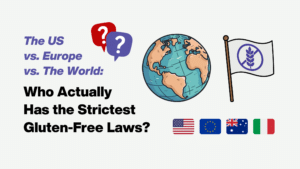Blog

Global Gluten-Free Standards: Who Has the Strictest Laws?
Safe travel starts with the label. Compare 2026 global gluten-free laws: from Australia’s 3ppm standard to unregulated regions. Know who to trust.

Gluten-Free Labels: Certified vs. Self-Declared – What Actually Keeps Consumers Safe?
Not all ‘Gluten-Free’ labels are verified the same way. We break down the critical safety gap between Self-Declared claims (the honor system) and Third-Party Certification—and explain why the GFFP 5ppm standard offers the widest safety buffer for celiac consumers.

The Truth About Gluten-Free Certification Standards
Not all labels are equal. Discover the gluten-free certification standard that earns trust and drives real results.

How Gluten-Free Certification Drives Local Food Tourism
Visitors often plan entire days around where they can safely eat. That means nearby shops, cafés, and attractions also gain from the increased foot traffic. In some cities, GFFP-approved restaurants have sparked gluten-free walking tours and local travel guides.

The Truth About Gluten-Free Certification
For people with celiac disease or gluten sensitivity, eating gluten-free isn’t a choice—it’s a medical necessity. Even a small amount of gluten can cause serious health issues. Certified gluten-free products help these individuals feel safe while shopping. That added security is why casual customers become loyal brand advocates who trust your products completely.

Affordable Gluten-Free Certification Costs Boosts Profit Margins
Gluten-free certification costs depend on your company\’s specific needs. These factors include operational complexity and the number of products certified. However, our certification is affordable, fitting comfortably within any budget. Therefore, it won’t break the bank, no matter the size of your business.
Have questions or not sure where to start?
Contact us to speak with a representative or receive a no-obligation quote. Our staff is available anytime to answer questions and help navigate the decisions toward achieving gluten-free certification for your company.
